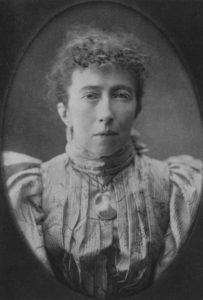Guest post by the Royal Astronomical Society, Platinum Sponsor of Ada Lovelace Day Live 2016.

Agnes Clerke (Royal Astronomical Society)
In the latest of a series of articles on early women members of the Royal Astronomical Society published in Astronomy and Geophysics, Sara Russell asks how Agnes Mary Clerke, who never went to school or university, became a highly respected science writer whose achievements stand alongside those of Mary Somerville. This blog post is a summary of Russell’s article which looks at the life and achievements of Agnes Clerke, one of the few women to be made an honorary member of the Royal Astronomical Society at a time when they were barred from the Fellowship.
It is interesting that Agnes Clerke was compared to Mary Somerville. Like Somerville, Agnes was mainly educated at home, although her parents were more supportive of her interest in science than those of Mary Somerville. As an adult, Agnes Clerke had a degree of financial independence, in common with other women who were made honorary members. However, Agnes operated within limitations imposed by society as a whole and by the Royal Astronomical Society in particular.
It appears that Agnes was also critically aware of her own strengths and weaknesses; her loyalty to her family led her to turn down at least one prestigious offer of employment. Russell paints a picture of a woman who nevertheless made the most of opportunities available to her, by serving on the Council of the British Astronomical Association, and learning observational astronomy under the aegis of David Gill at the Cape of Good Hope.
Agnes Clerke had such breadth and depth of knowledge that she could write authoritatively about the history of astronomy as well as the new discipline of astrophysics. The Royal Astronomical Society finally recognised her remarkable body of work in 1903, when she was made an honorary member at the same time as her friend, Lady Margaret Huggins. Sara Russell poignantly speculates on what work Clerke could have carried out if more professional opportunities had been open to her.
You can read more about Agnes Mary Clerke on the Astronomy and Geophysics website.
Russell, S. (2016), “Agnes Mary Clerke: stars, systems, problems”, Astronomy & Geophysics, 57(3) 3.16-3.17.